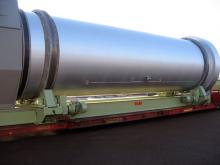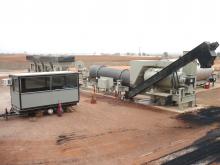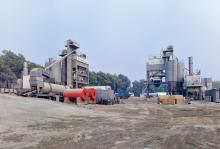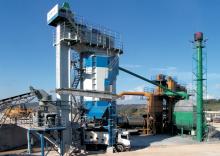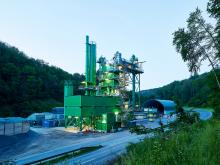One company has produced eight asphalt plants for a major project, and others are introducing new models as Patrick Smith reports
Algeria's US$11.2 billion East-West Highway development, the world's largest current highway construction project, forms part of the larger Trans-Maghreb Motorway project, and is scheduled for completion in 2010.It will run for 1,216km, ensuring the link between Annaba in the north-east and Tlemcen in the north-west, passing directly through 24 provinces and linking Algeria to Tunisia and Morocco. The bigger route will also link Libya.
The US$5 billion, six-lane, 400km Eastern section is being delivered by COJAAL (Consortium Japonais pour l'Autoroute Algerienne), a joint venture comprising five of Japan's largest companies,
Italian company SIM has delivered eight asphalt plants at key stages along the COJAAL section, which is divided into seven fields. The systems, constructed in the factory at Bussolengo, Italy, are able to produce up to 1,840tonnes/hour in total.
SIM explains that its project for the asphalt plants was created on the recommendation on behalf of the Japanese company WKK.
"At first it seemed an extravagant venture considering the technical implications and the involvement of several companies in the consortium with WKK, but then other technical and commercial meetings followed that were more and more credible and detailed," says SIM. The details were finalised following meetings at the
SIM started construction of each system, which included three CB240s; three SB210 plants; one SB280 and one CB210.
"The technical office has worked on each system with commitment and without a break, keeping in contact with the client in order to satisfy all the possible needs, even those that were unexpected and showed up at the last minute," says SIM.
"The technical specifications were defined in keeping with the particular requirements of the entire project, and for this reason maximum attention has been dedicated to the productive capacities, to the reliability of the system and the efficiency of the after-sales service, and to provide the resistance to seismic activity required."
The times of production, shipment and assembly have been studied and prepared and the specifications for each complied with as much as possible. A spare parts stock means these are always ready when needed, and interchanging elements can be used even if some systems that have been chosen have features that are different from the others.
SIM technicians are remaining on site and are exclusively available to look after the eight systems, guaranteeing a fast maintenance intervention during all the construction phases of the route.
New Top Tower
Over the last few years, Marini and parent company,
The Top Tower 4000 incorporates all the features of the 3000 but offers improvements. It maintains the drying-filtering unit.
"The decision to position the filter and storage silo for the recovered fines directly over the dryer drum not only reduces the footprint, it also has a positive impact on electricity consumption thanks to the optimised flow of gases (shorter, partly insulated dryer-filter duct) and recovery of the heat energy radiating out from the drum," says Marini. "The innovative Top Tower design leads to substantial savings, both in the consumption of electricity and fuel, and contributes to the reduction of CO2 emissions."
The new plant's mixing unit has been completely redesigned: the screen's full cladding reduces noise levels and heat loss, while screen mesh replacement and servicing has also improved thanks to a new Marini patented system. Access to hot bins and to ladder and catwalks is easier, meaning all servicing points can be reached from the cabin without stepping onto ground.
With a view to reducing noise levels and CO2 emissions, the mixing tower and the hot mix storage bin, including the travelling skip, have been designed to incorporate complete or partial cladding and all the elements generating noise or vapour emissions have been re-engineered and optimised.
Marini claims the Top Tower 4000 is the only plant whose structure is fully designed to comply with the seismic norms standardised all over the world.
Vitali recently installed a Top Tower 4000 in its quarry at Caponago, near Milan, Italy, which has the possibility to produce any type of asphalt mix. The system comprises six 18m³ aggregates feed units; a 2.7m diameter dyer drum fitted with a special ring to allow high rates of hot recycling; a bag filter( 1,280m² filtering surface and pre-separator), and a screening-weighing-mixing tower (fully cladded) with a 4,000kg mixer.
Five hot bins are for dried screened material plus a bypass for direct discharge (capacity 78tonnes); four hot mix storage bins have a total capacity of 400tonnes with asphalt mix weighing done using a weigh bridge installed under the hot mix storage bin discharge point, and two feed units for reclaimed material, which is fed into the drum via a recycling ring plus cold recycling in the mixer (both can be used at the same time) up to a maximum rate of 45-50%. The cold recycling solution in the mixer can be used for 100% cold recycling with emulsion.
The Cybertronic500 automatic control system offers the possibility to manage any type of additive (solid and liquid).
The company says an increase in the thickness of tank insulation achieved energy savings on bitumen heating ranging from 50-60%.
Growing company
Tallahassee, Florida, US-based asphalt producer and contractor, C. W. Roberts Contractor Company is said to be growing, despite the challenging economic times.
Last year, the company operated five
After recently acquiring Cougar Contracting Specialties, Roberts' officials saw a need for a sixth plant and an opportunity to lower operating costs.
"Cougar had grown to where it was purchasing approximately $8 million of asphalt a year," explains Geoffrey Thaw, area plant manager for C. W. Roberts.
Paving upwards of 90,718tonnes of asphalt in a year, the company needed a plant for internal consumption as well as to develop a market selling asphalt to other contractors.
Cougar Contracting's efforts had focused on local government and private work in the Fort Myers market but after the acquisition C. W. Roberts envisioned it expanding to state highway and interstate projects. The new Fort Myers plant had to be flexible enough to run a wide variety of mix designs including Superpave, and to accept from 25-30% reclaimed asphalt pavement (RAP) while meeting environmental regulations. The company also wanted a plant that could produce warm mix asphalt as the
C. W. Roberts bought a new Terex E3-400 counterflow drum mix plant capable of producing up to 363tonnes/hour, as well as two EMS200, 181tonne silos with a DC-190 dragslat conveyor and truck scale and an RA418 baghouse offering up to 1,658.6m2 maximum cloth area to meet environmental regulations. Other components included two 113,562litre vertical AC tanks; six-bin cold feed system; RAP system complete with a screen and crusher, and an energy centre with Terex Impulse II Control System.
The new E3-400 plant was bought with the warm mix asphalt system already installed, the first Terex plant ordered from the factory with this option.
"We have dozens of warm mix systems operating in the field, but those were field retrofits," says Steve O'Neal, asphalt plant district manager for Terex Roadbuilding.
The Terex warm mix system features single-point mixing of water and hot liquid asphalt. On exiting the expansion chamber, foamed asphalt is immediately injected into the drum to thoroughly and evenly coat heated aggregate. Claimed to be proven to reduce mix temperatures by up 32oC, the system delivers production capacities reaching 544tonnes/hour.
The new plant's first warm mix test in December 2008 was to pave at the plant site producing hot and warm mix versions of the specified mix, which contained 25% RAP.
The plant operator ran the warm mix asphalt at 129.4oC compared to 157.2oC as hot mix, and Thaw estimates a savings of 3litres/tonne of fuel oil and 0.2-0.3% lower asphalt cement content in the warm mix.
The paving crews noticed significant differences in warm mix asphalt workability. While finish rolling of the hot mix design averaged 82.2oC), the warm mix asphalt remained workable to 62.8oC).
Benninghoven's century of innovation
Another recent milestone is a prestigious project for
The company has supplied products to over 160 countries with more than 700 asphalt plants in operation worldwide, and it has grown from what was started as a small gear wheel manufacturing company 100 years ago by Otto Benninghoven.
It now employs over 600 people at its headquarters in Mülheim, Germany, and at 14 branches (ten are outside Germany), and is run by Bernd Benninghoven, the fourth generation of the family who became managing director in 2003, and who is "setting the high quality Benninghoven standards for the customers' future success." He has also overseen a big exapnsion of the company.
The basis of the company's innovative products is in the two main research and development departments of the company (one for the processes involving bitumen and its storage, transportation and blending with other agents: the other for the design of mixing plants utilising 3D-Cad Software).
To celebrate the centenary, Benninghoven organised special celebrations at its headquarters (15-23 September) and for over 3,000 visitors from 50 countries to see "how the company has developed positively." Several asphalt mixing plants and related products (recycling, granulator, storage systems, emulsion and polymer plants) were on display.
From gear wheels the company added boiler burners to its range in the 1950s, a product that initiated enquires for the heating of bitumen tanks (the start of Benninghoven's involvement with the asphalt industry).
Under the management of Erich Benninghoven, son of the company's founder, the first burners for aggregate dryer drums were produced, and the step into international markets was taken by Dr Rolf Benninghoven who took control of the company in 1966. Growing demand for Benninghoven products in the 1970s saw an increase in production. A new factory was built at Mülheim with new items introduced into the range, available as ancillaries to asphalt production (thermal oil heaters, bitumen storage tanks, filler heaters, bitumen barrel decanters, mastic asphalt mixers and polymer plants).
In 1986 recycling parallel drum plants were added, and the company then decided to build its own complete asphalt mixing plants with the first such plant being installed in 1988. With an output of 240tonnes/hour, it is still in operation.
A new factory was inaugurated in Wittlich in 1990 (it was extended in 2003) and in 2006 new equipment was installed. The Wittlich site is now the main factory for the heavy steel construction, while at Mülheim, which has been expanded over the years, the focus has been in technological steel construction and on production of mobile components. The group also fabricates in England.



